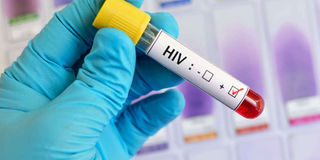We'll only rest once we get vaccine, say experts despite failed test

One of the biggest HIV vaccine trials in the world stopped after a review by an independent data safety monitoring board revealed the jab had not been proven effective in preventing the deadly disease. PHOTO | FOTOSEARCH
HIV researchers in Kenya and around the world are regrouping to look for a way forward after a promising new vaccine failed a critical test.
The HVTN 702 study, one of the biggest HIV vaccine trials in the world, stopped after a review by an independent data safety monitoring board revealed the jab had not been proven effective in preventing the deadly disease.
The announcement, made by the United States National Institute of Allergy and Infectious Diseases (NIAID), one of the funders of the clinical trial, also revealed there was no significant difference between the vaccine and placebo arms of the trial.
Launched in 2016, the study reached full enrolment last year with 5,407 HIV-negative men and women throughout South Africa. They were aged 18-35, a cohort at the highest risk of infection. Half the group was assigned to take six shots of the vaccine over 18 months. The other half received six shots of a placebo.
The interim analysis was timed to occur after at least 60 per cent of those enrolled had been in the study for at least 18 months, time enough for the vaccine to produce immunity. It found there were 129 new infections among those who received the real vaccine and 123 infections occurred among those that received the placebo.
The finding, however, does not mean the non-efficacy of the vaccine caused the HIV infections. The data safety monitoring board also identified no safety concerns.
WEALTH OF DATA
Mitchell Warren, executive director of Aids Vaccine Advocacy coalition, explained that studies were always looking at both efficacy and safety of an intervention.
Despite the disappointing news, the scientists are optimistic that all is not lost and there is still hope for a HIV vaccine. “A HIV vaccine is essential to end the global pandemic, and we hoped this vaccine candidate would work. Regrettably, it did not,” said NIAD Director Anthony Fauci in a press release.
HIV researchers, led by Prof Omu Anzala, Kenya Aids Vaccine Initiative (Kavi), University of Nairobi and Dr Kundai Chinyenze, Executive Medical Director at International Aids Vaccine Initiative (IAVI), said with the findings, many other HIV trials underway would be more robust and leverage on the wealth of data from HVTN 702 study.
“We learn from these trials and we are optimistic that with the ongoing work we will definitely develop a vaccine. If not today, then years to come,” said Prof Anzala while speaking to journalists during a science café organised by the Media for Environment, Science, Health and Agriculture (Mesha).
OTHER TRIALS
Prof Anzala said finding a vaccine was the only way to tame HIV. “We have come up with quite a number of prevention measures, but the number of new infections keeps going up. The incidence is, however, going down,” he said. “We need to get a hold of the infected population. We will only rest once we have a vaccine to tame this scourge.”
He said at University of Nairobi, there were quite a number of HIV trials in the pipeline. “We currently have two trials though more needs to be done since they are still in phase 1. They have undergone animal tests and we now want to do safety measures. I am hopeful,” he said.
Dr Chinyenze said with other trials in the pipeline, she was sure a safe and effective HIV vaccine will be achieved. “Although this was a painful answer, it does not mean that we stop. It means we redouble our efforts and learn what we can from that effort,” she said.
She said there were several approaches being evaluated and one of them will be to see if a vaccine can induce potential effective antibodies that can neutralise multiple strains of HIV.
Other HIV vaccine approaches in advanced phases of testing include Imbokodo, which is in a trial phase known as HVTN 705. Testing is also being done in five African countries of South Africa, Malawi, Zambia, Zimbabwe and Mozambique in 2,637 HIV-negative sub-Saharan African women for an experimental “mosaico” vaccine that targets multiple strains of HIV. It is designed to offer protection against a variety of global HIV strains.
The results of the study are expected late 2022.
The Mosaico (HVTN 706) is testing a similar vaccine in 3,800 male and transgender people at 57 sites in South and Central America, the US and Europe. The results are expected in 2023.
The PrEPVacc Trial, which is in phase 2b, is testing two vaccines regimen to prevent HIV infection and compare a new kind of daily pill for pre-exposure prophylaxis.



